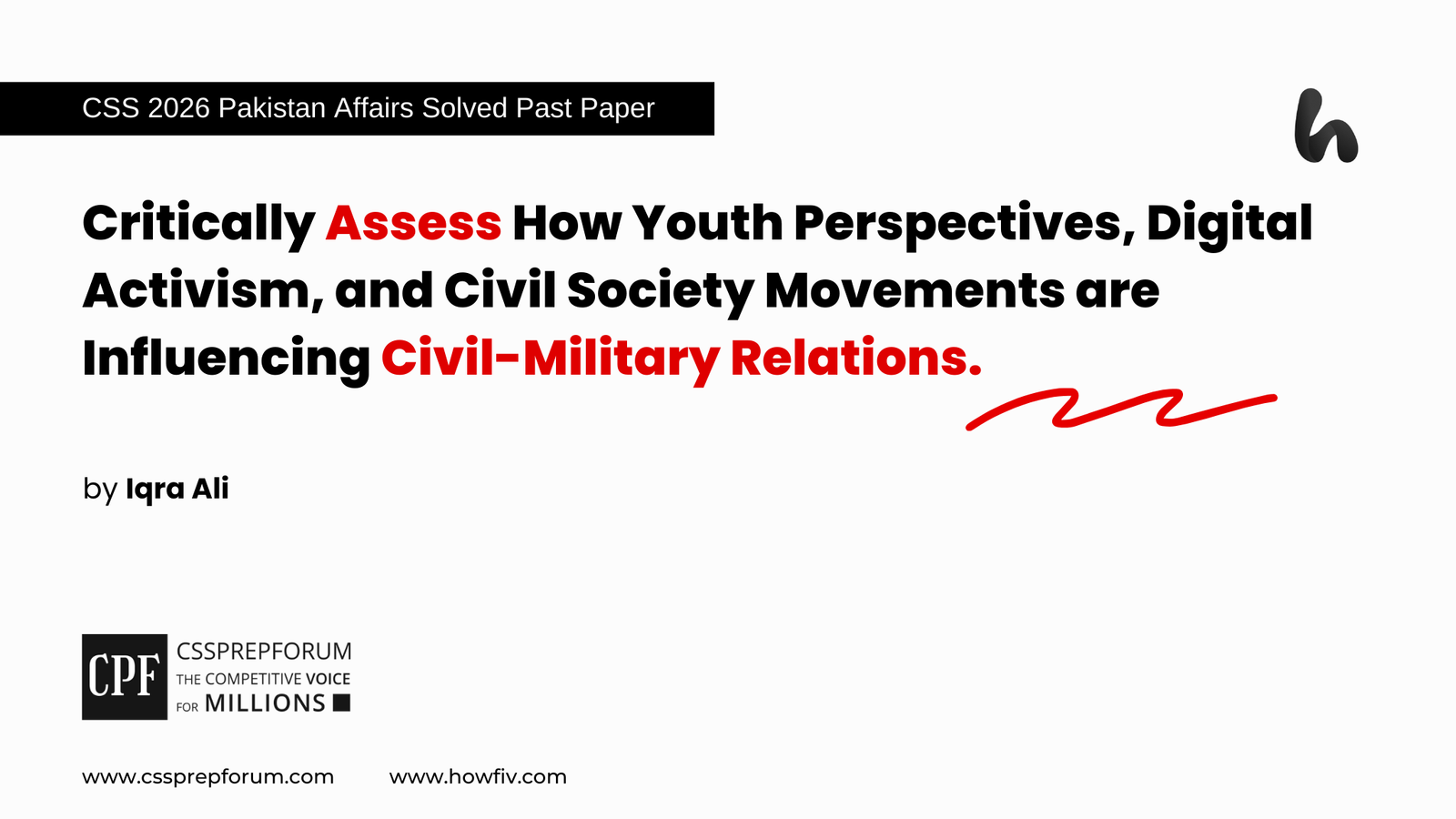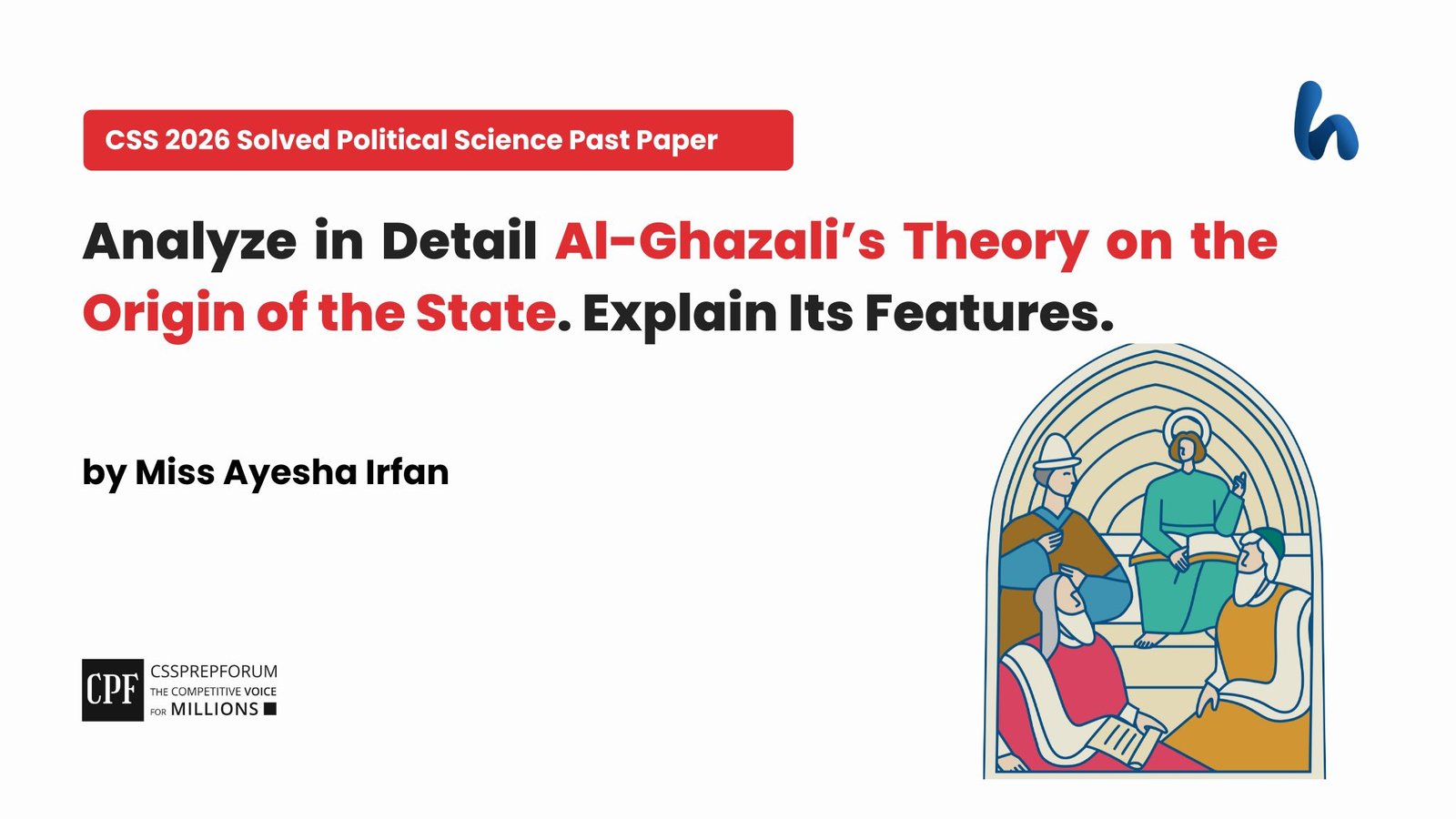The following article, “Public School System in Pakistan“, is written by Safina Naz, a student of Sir Syed Kazim Ali. Moreover, the article is written on the same pattern, taught by Sir to his students, scoring the highest marks in compulsory subjects for years. Sir Kazim has uploaded his students’ solved past paper questions so other thousands of aspirants can understand how to crack a topic or question, how to write relevantly, what coherence is, and how to include and connect ideas, opinions, and suggestions to score the maximum.

Outline
1- Introduction
- ✓ The public school system is fraught with inaccessibility to millions of children, lack of quality education, and the problem of systemic governance crisis in Pakistan’s education sector.
- ✓These loopholes are remediable through improving educational governance and institutionalizing charter schools.
2- Current situation of the public school system in Pakistan
- ✓According to the Economic Survey of Pakistan 2022-2021, “The public education system in the country serves sixty-nine per cent of children.”
3- Issues and challenges confronting the public education system in the country
- ✓Growing inaccessibility issue
- Case in point: According to UNICEF, “Literacy rate is dismally low standing at fifty-eight per cent, with one of the highest out-of-school children touching twenty-two million.”
- ✓Lacking quality of learning
- Case in point: According to a report by Alif Ailaan, “Majority of the students, about ninety per cent studying in public schools at primary level, cannot read or write a simple text.”
- ✓Missing an effective educational governance framework
- Case in point: “Due to weak governance, as many as sixty thousand ghost teachers and seven thousand ghost schools encumber the public school system in Pakistan”, as per the estimates of the Asian Human Rights Commission.
4- Strategies to enhance the capacity of the public education system in Pakistan
- ✓To improve educational governance
- Case in Point: According to the United Nations Educational Scientific and Cultural Organization (UNESCO), “Governance plays a crucial and game-changing role in improving the quality of education. “
- ✓To institutionalize charter schools
- Case in point: In Arizona, according to the City Journal, the charter schools, numbering fifteen thousand, have performed well compared to other educational institutions in terms of management and academic performance.
5- Conclusion

Answer to the Question
Introduction
The public education system is the prominent source of national integration and socio-economic upliftment of a country. European countries, along with some countries in Asia, such as Japan and Singapore, instituted an effective public school system in the nineteenth and twentieth centuries, leading them to the pinnacle of socio-economic and political development. On the other hand, most of the developing countries have ignored an extensive and effective public school system, leading to poverty, illiteracy, insularity, intellectual lethargy, extremism, and social divisions based on gender, class, and ethnicity. Unfortunately, Pakistan is among those developing nations that have ignored a productive public education system. The public education system in Pakistan is marred with systemic issues. The literacy level in the country is dismally low, and the absence of effective educational governance has impeded the working of the public school system in Pakistan. Nonetheless, to improve the efficiency and effectiveness of the public education system, Pakistan needs to lay down a robust educational governance framework and initiate charter schools that would cater to the ballooning population’s needs.
Current situation of the public school system in Pakistan
Given its immense importance, Pakistan has formed a comprehensive yet complex public school system after its inception, which was the mainstay of the country’s goal to achieve universal literacy. In general, the education system in the country has three parallel schools: private schools, public schools, and Deeni Madaras. Among these, the public school system serves sixty-eight per cent of the students between the ages of four and sixteen (Economic Survey of Pakistan 2021-2022).Furthermore, the educational institutions are divided into pre-primary school, primary school, middle school, high school, higher secondary, inter-colleges, degree colleges, universities, and technical and vocational institutions. The period for schooling is 12 years, with five years in primary school, three in middle school, and four in high school.
Moreover, according to Article 25-A of the constitution, every country’s child is entitled to free and compulsory education from the age of five to sixteen. In addition, the administration and management of the public school system are primarily in the hands of provincial governments after the Eighteenth Amendment, with only the coordination and facilitation of the federal government through the Ministry of Federal Education and Professional Training to maintain coherence in education policies. In brief, the public education system in Pakistan strangles a complex web of Pakistan’s administrative and policy-related setups.
Issues and challenges confronting the public education system in the country
Though Pakistan has one of the oldest and most extensive public school systems, rapid population increase and economic and political crises have overburdened the system, impacting the literacy level and quality of learning in public schooling.
Growing inaccessibility issue
Pakistan has failed to educate millions of aspiring and deserving masses, resulting in an increasing illiteracy rate in the country. For instance, according to UNICEF, the overall literacy level in Pakistan stands at fifty-eight per cent, with one of the second largest out-of-school children (OOSC), estimated at 22.8 million. Similarly, the gross enrollment ratio of forty-three per cent in secondary-level education in Pakistan is the lowest in South Asia (UNESCO). Moreover, the disparities based on geography, gender, and socio-economic status have deprived a major chunk of children of basic education. For example, as many as fifty-two per cent of poor children in Sindh and seventy-eight per cent of girls in Baluchistan are out of school. Corporal punishments, low transportation in public schools, lack of girl schools, poverty and excludability, safety concerns, especially for girls, non-availability of basic amenities such as toilets and electricity, and sociocultural factors are the pressing issues that overwhelm the fragile and overburdened public school system in the country. In brief, due to resource constraints and socio-economic factors, the public education system is plagued with many problems, making it impossible to cater to a burgeoning population’s needs.
Low quality of education
Besides inaccessibility in serving the poor and the disposed, public education in Pakistan cannot compete with its private counterpart regarding quality learning. Quality education, according to the “Education for All (EFA) Global Monitoring Report 2005 – The Quality Imperative (EFA: GMR)”, refers to a learner’s cognitive development and values and attitudes necessary for responsible citizenship. Cognizant of the growing issue of quality education in the country, Pakistan had, for the first time, taught a standard-based education system in 2017. This is a better initiative that the government has taken. However, despite setting these standards for education, the public education sector in Pakistan is still grappling with various challenges, such as the lack of professional teachers, absence of career counselling, outdated curriculum, absenteeism, dropouts, and the lack of science laboratories. These challenges have resulted in lower education outcomes in Pakistan. For instance, according to Alif Ailaan, a not-for-profit organization, as many as ninety per cent of the learners at the primary level in public sector education cannot read or write a simple paragraph. In a nutshell, the absence of quality school education reflected in lower educational outcomes is, unfortunately, a hallmark of the public school system in Pakistan.
Missing an effective educational governance framework
Moreover, Pakistan’s public school system lags because of the governance crisis in the public sector, impeding the country’s goal to attain universal literacy and inhibiting quality education. Rampant corruption, political meddling in administrative affairs of the education sector, lack of planning, and the absence of accountability have jolted the public school system of Pakistan. For example, according to the Asian Human Rights Commission, seven thousand ghost schools and more than sixty thousand ghost teachers exist in Pakistan. Furthermore, a UNESCO study in Pakistan identifies fertile grounds for corruption in the education sector regarding distributing free books to children, recruitment and promotion of education sector employees, including teachers, and equipment supply.
Strategies to enhance the capacity of the public education system in Pakistan
To improve educational governance
Nonetheless, improving educational governance can improve Pakistan’s public school system. According to UNESCO, governance plays a crucial and game-changing role in improving the quality of education. Therefore, Pakistan needs to take the following measures to enhance the governance framework in the education sector. First, the education departments must enhance the monitoring mechanism by introducing biometrics to monitor teachers’ absenteeism. Second, strict action should be taken against ghost teachers and the politically-backed administrative staff involved in corruption and nepotism, especially regarding ghost elements in the education sector. Third, since good governance demands transparency, regular third-party audits must be initiated frequently to ascertain loopholes in the public school system. In short, bringing accountability and transparency and employing technology can help improve educational governance in the country.
To institute charter schools.
Besides, some novel ideas must be explored; one of the ideas is charter schools. Being operational in the United States, charter schools are government-funded programs operated by independent operators under strict regulations and monitoring of state institutions. The purpose of charter schools is to improve learning for disadvantaged students. For example, charter schools in Arizona have excelled in academic excellence in learning outcomes, student-teacher liaison, flexible recruitment, and high motivation of teachers and students (City Journal). The idea can be replicated for the following reasons. First, charter schools would ensure flexibility in hiring and firing teachers, ensuring accountability. Second, since the public sector in Pakistan is impaired by administrative inefficiency, charter schools would lessen the burden on the government. In short, charter schools in Pakistan can help reduce the burden on Pakistan’s unaccountable, lazy, and badly-governed public school system.
Conclusion
To conclude, Pakistan has had a comprehensive and one of the oldest public school systems aided by well-thought-out education policies. Nonetheless, the lack of good governance in the public school system has ruined the system’s capacity. As a result, public education has left millions to attain literacy and deprived millions of students studying in the public school system of a quality education. To improve the systemic capacity of the public school system, it is imperative to enhance education governance and adopt some novel ideas, such as charter schools. These measures will help the public school system advance towards the right direction.

CSS Solved Past Papers’ Essays
Looking for the last ten years of CSS and PMS Solved Essays and want to know how Sir Kazim’s students write and score the highest marks in the essays’ papers? Then, click on the CSS Solved Essays to start reading them.
CSS Solved Essays
CSS Solved General Science & Ability Past Papers
Want to read the last ten years’ General Science & Ability Solved Past Papers to learn how to attempt them and to score high? Let’s click on the link below to read them all freely. All past papers have been solved by Miss Iqra Ali & Dr Nishat Baloch, Pakistan’s top CSS GSA coach having the highest score of their students. General Science & Ability Solved Past Papers
Articles Might Interest You!
The following are some of the most important articles for CSS and PMS aspirants. Click on any to start reading.











